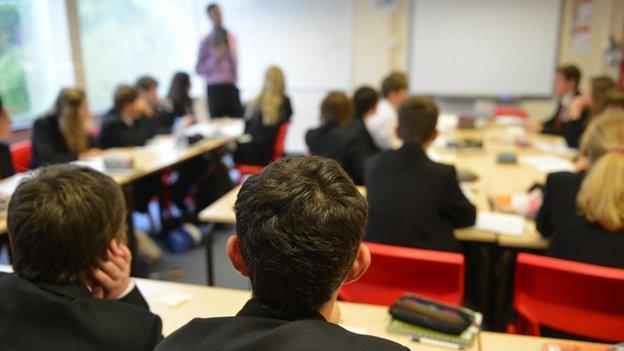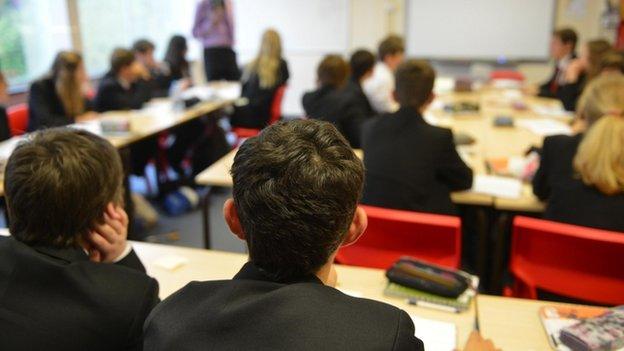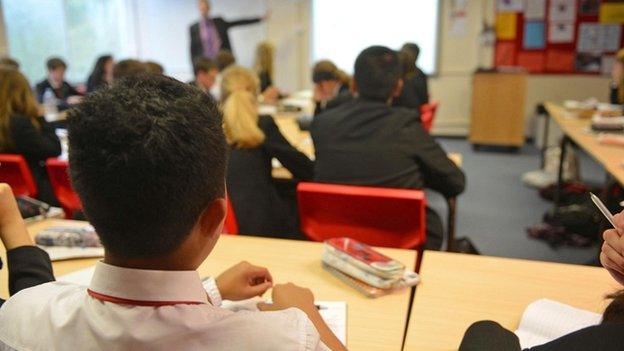Academy chain schools 'not good enough'
- Published

The Department for Education says results must improve this year
An academy chain has been accused by Ofsted inspectors of not making enough progress, with warnings the quality of education for too many pupils is "not good enough".
The E-Act trust runs 23 academies across England and the Ofsted report says pupils from "poor backgrounds do not do well enough" in its schools.
Last month the academy chain scrapped all its local governing bodies.
E-Act said Ofsted recognised "substantial progress" had been made.
The Department for Education said unless standards were improved it would take "further action".
The same warning was given last week to England's biggest academy chain, AET, after tough criticism from Ofsted, which accused AET of "failing too many pupils".
Ofsted carried out a "focused inspection" on schools run by the E-Act chain, which in the past had been heavily criticised by inspectors and which two years ago had 10 schools taken away.
'Too low'
This latest report commends E-Act for making progress and adopting a "more robust and direct approach to school improvement".
But inspectors say the chain's schools are still not good enough and "more than half are not providing a good standard of education", including five rated as "inadequate".

E-Act has been told that too many of its pupils are not getting a good enough education
There is particular criticism of E-Act's secondary schools, with Ofsted saying standards are "too low" and attempts to improve "have not had enough impact".
E-ACT's 23 schools are spread across England, with clusters in places including the West Midlands, Buckinghamshire, Bristol, Yorkshire and the North West.
Academy chains receive public funding to operate schools, with E-Act's accounts up to August 2014 showing an income of £135m.
Ofsted says since joining E-Act, six of the 23 academies have declined from their previous inspection grade, six have improved and 10 have remained the same. There is no previous inspection grade for one academy.
A response from E-Act said the inspectors had recognised improvements had been made, particularly in primary schools.
"Over the past year, we have radically overhauled the way that E-Act is run, and the way that our academies operate, so that children and young people genuinely have an excellent education during their time with us.
"This is now beginning to bear fruit, but there is more work to be done."
No parent governors
Last month E-Act announced plans to scrap local governing bodies, including parent governors, in all of its schools, ending their role of holding schools to account.
Instead scrutiny of schools will be carried out centrally by the chain, with the former governing bodies replaced by groups who will be "ambassadors" for each school.
Christine Blower, leader of the National Union of Teachers, said: "Time and again reports are released which show that academy status has no direct link with good outcomes for young people.
"Academy conversion is not a school improvement strategy and claiming this to parents and voters is deeply misleading."
Labour's shadow schools minister Nic Dakin accused ministers of "taking their eye off the ball on school standards and failing to ensure that all schools, including those in academy chains, are properly accountable".
"Two years after Ofsted warned that E-Act was failing to take effective action to improve standards in many of its schools, we find out that the quality of provision for too many pupils in these academies is still not good enough."
A Department for Education spokeswoman said: "This Ofsted report shows E-Act is beginning to show signs of improvement since its performance was challenged in 2014."
"However, too many children are not achieving well enough and the impact of these changes must lead to better results in 2016 and beyond."
- Published19 January 2016

- Published4 February 2016

- Published25 March 2014

- Published25 February 2014
